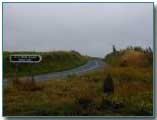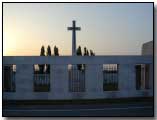Feature Articles - To what extent was New Zealand 'born as a nation' in World War I?
 In order to evaluate
the extent to which New Zealand was 'born as a nation' in World War I, it is
first necessary to explore the elements that constitute a nation, which in
itself is problematic.
In order to evaluate
the extent to which New Zealand was 'born as a nation' in World War I, it is
first necessary to explore the elements that constitute a nation, which in
itself is problematic.
By then tracing the emergence and rise of the New Zealand nation from the late nineteenth century up until the end of the First World War, it is possible to examine the importance of the war to New Zealand's nationhood. A distinction can thus be made between the war being solely responsible for the 'birth' of the nation, and the war being part of a complicated process towards the nation state.
By contemporary academic standards, it is unlikely that New Zealand achieved the status of nationhood before, or even for some years after, the First World War. In theory, a nation was to be independent, yet New Zealand only achieved formal independence in 1947. But New Zealand's complex relationship with Great Britain did not preclude the formation of a nation.
The transition from the provincial system to central government, and finally to party politics meant that by the 1890s, New Zealand was self-governing in terms of internal affairs. Another traditionally desired characteristic in a nation was the presence of one race that shared a common history, language and culture. Although the concept of a bicultural nation may appear problematic, this essay must engage with it because it was a reality to the New Zealand situation. Keith Sinclair approaches this problem by speaking of a 'Pakeha nation'.
Yet this theory is eurocentric, because it assumes a nation into which Maori would be assimilated. Maori were in fact strongly divided in their desire to become citizens of the nation. There were many, however, who chose to support a nation that they increasingly saw themselves a part of. Therefore, biculturalism was not an impediment to a 'New Zealand nation'.
 If New
Zealand was capable of reaching nationhood with neither independence nor
monoculturalism, then it is clear that the methodical application of
'desirable' characteristics does not test a country's nationhood. As a
nation is not tangible, it cannot be successfully measured in a 'concrete'
way. Sinclair adopts the view that a nation is simply a group of
people who think that they are a nation.
If New
Zealand was capable of reaching nationhood with neither independence nor
monoculturalism, then it is clear that the methodical application of
'desirable' characteristics does not test a country's nationhood. As a
nation is not tangible, it cannot be successfully measured in a 'concrete'
way. Sinclair adopts the view that a nation is simply a group of
people who think that they are a nation.
So, by viewing the building of a nation as a 'social process', it is possible to trace the rise of nationalism in New Zealand. As it is a sentiment arising directly from belonging to a nation, it is indicative of one. The decision to remain outside the Australian Federation was one of the earliest assertions of New Zealand's nationalism.
In addition, it is also reasonable to assume that in order to fight together in the Great War, there already existed at least some degree of nationalism among New Zealanders. Since the forging of the nation state began well before the First World War, the role that the war had in shaping the nation needs to be investigated.
 Although the concept of New Zealand's nationhood had evolved prior to the
war, it was the First World War that spurred a greater awareness among New
Zealanders of what it meant to be a 'New Zealander'. According to Joe
Gasparich, the shaping of the New Zealand character had been in the making
for some time, but it was Gallipoli that had consolidated the character of
the New Zealander.
Although the concept of New Zealand's nationhood had evolved prior to the
war, it was the First World War that spurred a greater awareness among New
Zealanders of what it meant to be a 'New Zealander'. According to Joe
Gasparich, the shaping of the New Zealand character had been in the making
for some time, but it was Gallipoli that had consolidated the character of
the New Zealander.
While this theory is feasible, it demands an explanation as to why the war alone was capable of arousing a dormant sense of identity within New Zealanders. Burton suggests that the Great War created catastrophe and great suffering on a scale never before seen, which inspired New Zealanders to turn inwards and make sense of their own identity. The war was also an event that embraced New Zealand as a whole; from the soldiers who had fought and died on the battlefields, to those on the home front who were situated thousands of miles away. To some extent, the First World War forced New Zealanders to work closely as a nation, because the effective resistance to foreign aggression required a strong sense of unity.
E J Tapp feels that prior to the war New Zealanders, isolated from the rest of the world, were indifferent to international matters. But the outbreak of war had caused them to revise their conception of the world around them. With this came the awareness of their own status as a political unit that had the ability to impact on world affairs.
National pride, too, became more noticeable after the war. Prior to World War I, most New Zealanders identified themselves as Britons. At the time, Anthony Trollope even commented that New Zealanders were more English than the Englishmen of Britain. However, after the war, New Zealanders grew ashamed to be associated with Britain.
It was the New Zealand troops that first won and then briefly secured Chunuk Bair, only to lose it after a succession of British blunders. Such incidents, along with the carnage at Gallipoli, led to the realisation that Britain was not infallible. After the war, New Zealanders no longer idealised Britain because they became increasingly conscious of their own achievements.
The war also enabled New Zealand to gain a unique national identity that was recognised both within the country and abroad.
According to Jock Phillips, the general public in New Zealand perceived those who had fought in the war as 'heroes'. Outsiders perceived New Zealand as a 'man's country'. So, manhood quickly became a symbol for New Zealand's nationhood.
Phillips still insists that New Zealand had not achieved nationhood in the eyes of the world at the time of Gallipoli, but an examination of the actions of other nations towards New Zealand in the post-war peace negotiation period does not bear out this assertion. For the first time, New Zealand was represented as a nation in its own right at an international conference.
Later, when New Zealand was invited to join the League of Nations, Prime Minister William Massey spoke of how New Zealand had joined as 'a self-governing nation within the empire'. It is not enough that the inhabitants of a nation alone become conscious of their nationhood; for outside acknowledgement, too, proved a critical factor in New Zealand's status as a nation.
That New Zealand was 'born a nation' in World War I should not suggest nationhood was solely achieved during the First World War. Many of the elements that drew New Zealanders together as a nation were present well before 1914. However, in the rise to nationhood, the Great War was the turning point. Up until the war, New Zealand had, to a large extent, existed as a nation. The war brought a greater recognition of New Zealand as a united entity. A nation is not a true nation if it is not accepted and realised as one. It was the Great War, then, that allowed New Zealand finally to cross the threshold to nationhood.
Article contributed by Anita Kundu, comments welcome.
Bibliography
Baker, P.
King and Country Call: New Zealanders, Conscription and the Great War,
Auckland, 1988
Boyack, N. Behind the Lines: The Lives of New Zealand Soldiers in the First World War, Wellington, 1989
Boyack N. and J. Tolerton. In the Shadow of War: New Zealand Soldiers talk about World War One and their Lives, Auckland, 1990
Hamer, D. 'Centralization and Nationalism (1870-1912)', in Keith Sinclair, ed., The Oxford Illustrated History of New Zealand, Auckland, 1990, pp. 125-152
King, M. New Zealanders at War, Auckland, 1988
McGibbon I. Blue-Water Rationale: The Naval Defence of New Zealand 1914-1942, Wellington, 1981
McIntyre, W.D. 'Imperialism and Nationalism', in Geoffrey W. Rice, ed., The Oxford History of New Zealand, Auckland 1992, pp. 337-350
Olssen, E. 'A Nation, 1914-1918', in Judith Binney, Judith Bassett and Erik Olssen, The People and the Land. Te Tangata me Te Whenua: An Illustrated History of New Zealand, 1820-1920, Wellington, 1990, pp. 319-339
Phillips, J. A Man's Country? The Image of the Pakeha Male- A History, Auckland, 1987
Phillips, J. 'War and National Identity', in David Novitz and Bill Willmott, ed., Culture and Identity in New Zealand, Wellington, 1989
Phillips, J., N. Boyack and E.P. Malone. The Great Adventure: New Zealanders Describe the First World War, Wellington, 1988
Pugsley, C. Anzac: The New Zealanders at Gallipoli, Auckland, 1988
Shadbolt, M. Voices of Gallipoli, Auckland, 1988
Sinclair, K. A Destiny Apart: The New Zealand's search for National Identity, Wellington, 1986
Sinclair, K. A History of New Zealand, Auckland, 1991
Sinclair, K. 'The Beginnings of a Colonial Nationalism: Richard Jebb in New Zealand, 1899', in John Eddy and Deryck Schreuder, The Rise of Colonial Nationalism, Wellington, 1988
Sinclair, K. The Native Born: The origins of New Zealand Nationalism, np, 1986
Sinclair, K. Towards 1990: Nation and Identity, Dunedin, 1990
Tapp, E.J. 'A Maturing People', New Zealand International Review, 13, 3, 1988, pp. 21-22
'Kitchener's Army' comprised Men recruited into the British Army a result of Lord Kitchener's appeal for volunteers.
- Did you know?
